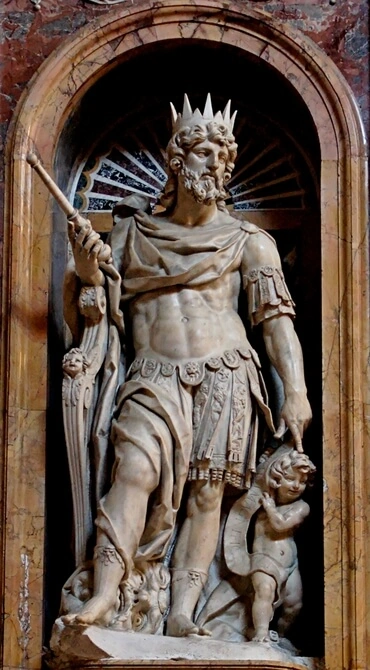1
Venit autem David in Nobe ad Achimelech sacerdotem : et obstupuit Achimelech, eo quod venisset David. Et dixit ei : Quare tu solus, et nullus est tecum ?
2
Et ait David ad Achimelech sacerdotem : Rex præcepit mihi sermonem, et dixit : Nemo sciat rem, propter quam missus es a me, et cujusmodi præcepta tibi dederim : nam et pueris condixi in illum et illum locum.
3
Nunc ergo si quid habes ad manum, vel quinque panes, da mihi aut quidquid inveneris.
4
Et respondens sacerdos ad David, ait illi : Non habeo laicos panes ad manum, sed tantum panem sanctum : si mundi sunt pueri, maxime a mulieribus ?
5
Et respondit David sacerdoti, et dixit ei : Equidem, si de mulieribus agitur : continuimus nos ab heri et nudiustertius, quando egrediebamur, et fuerunt vasa puerorum sancta. Porro via hæc polluta est, sed et ipsa hodie sanctificabitur in vasis.
6
Dedit ergo ei sacerdos sanctificatum panem : neque enim erat ibi panis, nisi tantum panes propositionis, qui sublati fuerant a facie Domini, ut ponerentur panes calidi.
7
Erat autem ibi vir quidam de servis Saul, in die illa, intus in tabernaculo Domini : et nomen ejus Doëg Idumæus, potentissimus pastorum Saul.
8
Dixit autem David ad Achimelech : Si habes hic ad manum hastam, aut gladium ? quia gladium meum, et arma mea non tuli mecum : sermo enim regis urgebat.
9
Et dixit sacerdos : Ecce hic gladius Goliath Philisthæi, quem percussisti in Valle terebinthi, est involutus pallio post ephod : si istum vis tollere, tolle : neque enim hic est alius absque eo. Et ait David : Non est huic alter similis, da mihi eum.
10
Surrexit itaque David, et fugit in die illa a facie Saul : et venit ad Achis regem Geth :
11
dixeruntque servi Achis ad eum cum vidissent David : Numquid non iste est David rex terræ ? nonne huic cantabant per choros, dicentes : Percussit Saul mille, et David decem millia ?
12
Posuit autem David sermones istos in corde suo, et extimuit valde a facie Achis regis Geth.
13
Et immutavit os suum coram eis, et collabebatur inter manus eorum : et impingebat in ostia portæ, defluebantque salivæ ejus in barbam.
14
Et ait Achis ad servos suos : Vidistis hominem insanum : quare adduxistis eum ad me ?
15
An desunt nobis furiosi, quod introduxistis istum, ut fureret me præsente ? hiccine ingredietur domum meam ?







